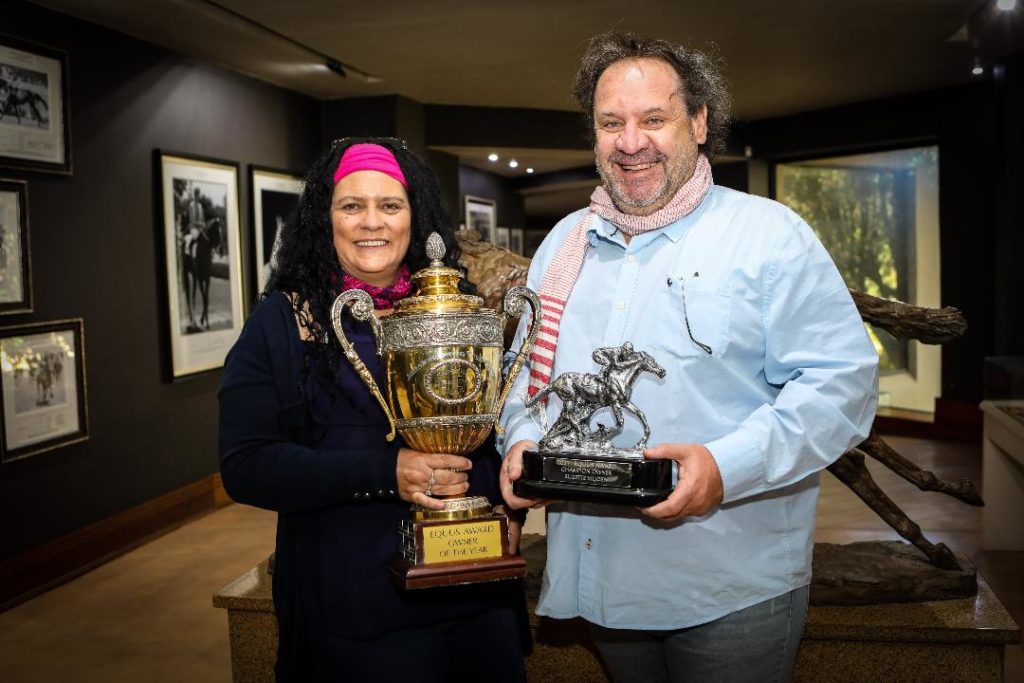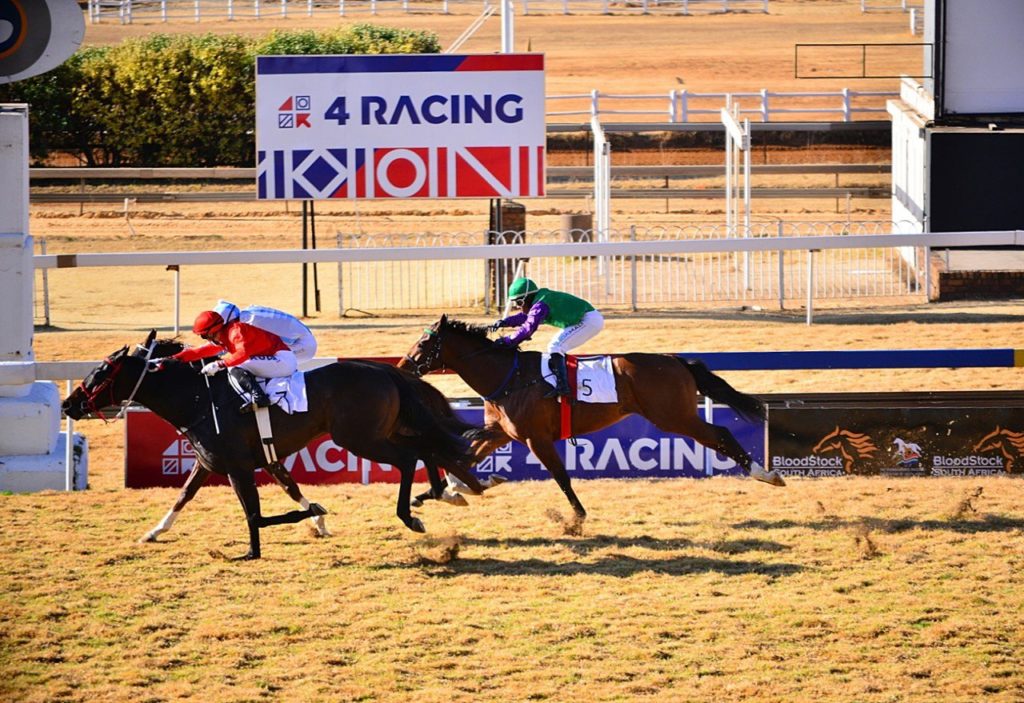Newly crowned SA Champion owner Suzette Viljoen and her husband Basie collected their Equus trophies at the BSA Sales Complex today and richly deserve the acknowledgement after a substantial investment since 2018, in a declining industry.
While the debate over the uncertainty of the incorporation of restricted race stakes or not at the eleventh hour threatened to spoil the Viljoen family’s special moment, the magnanimity and sportsmanship of multiple past champion owner Chris van Niekerk – the winner with the sales (restricted) races included – managed to restore a sense of dignity.

Suzette and Basie Viljoen – with their trophies at the TBA Sales Complex on Friday (Pic – Candiese Lenferna)
Talking to Business Live, Van Niekerk heralded Suzette Viljoen’s achievement ‘a great story for racing’.
“I am so happy for Suzette to have won. What is good for racing is good for all of us who are part of it. We all win. There are already too many squabbles in a relatively small industry. We need more love and unity,” Van Niekerk told Business Live.
Vee Moodley, CEO of the NHA, confirmed that their statistics put Van Niekerk on top, but said “the NHA has no jurisdiction over Equus, they make their own rules”.
The Equus final figures, which excludes restricted race stakes:
- Suzette Viljoen: R5,390,550
- Drakenstein Stud: R5,343,375
- Chris van Niekerk: R5,199,900.
Ironically the very sale being attended by the Viljoens today offers four R400 000 linked races and it’s a subject worthy of more debate, as the carrot that is dangled by the sales companies is on the ‘should or shouldn’t we’ checklist for many folk when considering buying a racehorse, in good and bad times.
Just have a look at the runners in the two R400 000 BSA Sales Cup races at Turffontein on 7 August.
Cream of the crop, or close to it – but not worthy to earn?

William Robertson beats Bard Of Avon to win the BSA Sales Cup (C&G) at Turffontein on 7 August (Pic – JC photos)
It is also interesting that restricted races don’t count, but Africa’s greatest horse race does – the Vodacom Durban July is a handicap, and the best performances at the weights this year were by horses who finished 7th and 4th. T
The NHA, who show two sets of stats on their websites, apparently has no problem with this, nor with all the other handicap races we stage.
And South Africa is the only racing jurisdiction in the world where restricted races are not in the stats.
In an article published seven years ago, we observed that the NHA states on its website that ‘The National Horseracing Authority is responsible for maintaining the official statistics for horseracing in South Africa and Zimbabwe. The purpose of the statistics is to provide accurate information for use by the industry. The information must therefore not be biased or misleading. Restricted Races have the potential to distort the information significantly and it is important that they be considered very carefully in regard to their inclusion in statistical information.’
It is not clear what exactly is meant by ‘maintaining the official statistics’ – no reference to this can be found in the Constitution or the Rules of NHA. It seems sensible to assume that ‘maintaining statistics’ means the recording of results of races and that the NHA is the custodian of such results.

The definition of a result is the outcome of a race staged by a Racing Operator under the Rules of the NHA. As long as a race conforms to this, the NHA must record the outcome. The NHA does not have the power nor mandate to decide which races to record and which not.
Once a race is a race it cannot be ignored on whim, or otherwise.
The statistical manipulation of the outcome of races is not the domain of the NHA.
Such manipulation can be implemented by anyone, usually for specific purposes.
When the NHA states that the purpose of the statistics is to provide ‘accurate information for use by the industry’ it is incorrect. There can be no such thing as accurate statistics, only accurate input of information.
On the point of Restricted races and their possible distortion of information, the point is that anyone can use and manipulate recorded results as deemed necessary.
If the Racing Association wished to stage Equus Awards and omit certain parts of the results record before it decides on awards, it is entitled to do so.
If the breeders association wishes to omit certain parts of the results record before it determines the performance of stallions or breeders, it is entitled to do so.
In short, whoever has a purpose may use information to suit that purpose.
All it needs is a clear statement of intent.
In a nutshell, it is not up to the NHA to decide which part of results should count and which shouldn’t.
Every result of every legitimate race – as per the NHA’s definition in the Rules – counts.
If none of the big races are restricted, then why are there, year after year, unhappy connections of intended runners in the Durban July, where the field size is limited and arbitrary eliminations are made.
Millions at stake in a handicap (check the definition!) and horses are tossed out on a whim.
But that’s not a restriction, apparently.








